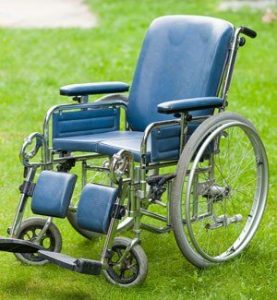Chicago Elderly Caregiver Abuse Lawyer
 Physical abuse and psychological abuse are among the most common forms of nursing home abuse. These abuses are often perpetrated by the caregiver directly responsible for the health and well-being of the elderly person. These abusive caregivers may be professional nurses or staff at a nursing home, or may be friends and family members trusted to take care of the elderly loved one.
Physical abuse and psychological abuse are among the most common forms of nursing home abuse. These abuses are often perpetrated by the caregiver directly responsible for the health and well-being of the elderly person. These abusive caregivers may be professional nurses or staff at a nursing home, or may be friends and family members trusted to take care of the elderly loved one.
When a professional caregiver takes advantage of or abuses seniors, he or she commits not only a criminal offense, but also violates civil laws meant to protect the elderly. It is important to report any such abuse to law enforcement and to the Illinois Department of Public Health. Once you have done so, or even before, call us at Sexner Injury Lawyers LLC at (312) 243-9922. Our experienced Chicago elder abuse attorneys can discuss all your options going forward.
What Is a Professional Caregiver?
About 30% of the time, caregivers are unpaid; usually, they are family members such as children, parents, or siblings. Neighbors, church members, or other volunteers make up the ranks of these non-professional caregivers as well.
The rest of the time, "professional caregivers" are paid employees who work for nursing homes, convalescent homes, inpatient facilities, hospitals, doctors' offices, or freelance. These professional caregivers should offer the highest degree of care and compassion for their patients. Unfortunately, this is not always the case.
Causes of Caregiver Abuse
Just like the population in general, caregivers have their own share of problems. They are not immune to depression, drug abuse, violent tendencies, laziness, untruthfulness, anxiety, or other psychiatric and psychological disorders. Regardless of whether the caregiver is paid or unpaid, there is always the potential for abuse.
In addition to any natural tendencies or shortcomings of the caregiver, there’s also:
- Overwork,
- Lack of training, and
- The general stress involved with a job that has high expectations.
The caregiver may feel like he or she is trapped, helpless, and undervalued. As a result, the caregiver may lash out at the patient.
Common Types of Caregiver Abuse
- Neglect or Abandonment: Neglect occurs when a caregiver fails to provide basic care to the elderly person. This may be intentional or accidental, and is the most common form of caregiver abuse. Abandonment is when the caregiver simply leaves the patient alone, sometimes in a public place, for long periods of time (or never comes back at all). Such exposure may end up being fatal for the elderly patient.
- Physical: This refers to non-accidental use of excessive force against an elderly person, resulting in physical pain and injury. Physical abuse can include hitting and shoving, as well as an inappropriate use of physical restraints.
- Emotional: This sort of psychological abuse includes the use of words and behavior that cause an elderly person emotional distress and anxiety. It can include verbal threats and intimidation, humiliation, and isolating the person from others.
- Sexual: Any form of sexual contact without knowing consent from an elderly person constitutes sexual abuse. This includes involving the person in sex acts, undressing him or her inappropriately, physical touching, and more.
- Financial: Theft of property, accessing bank accounts, and fraud are all forms of financial abuse. When a caregiver is a spouse or other family member, this type of abuse may be difficult to notice, but is still a violation of trust.
What Are Warning Signs of Caregiver Abuse?
If any of the following warning signs are present, an abusive relationship may be present or likely to develop. In such circumstances, the patient should be immediately removed from the care of that caregiver and you should consider contacting the authorities. Some of the warning signs of such a caregiver include:
- Depression
- Low self-esteem
- Resentful, poor attitude towards family
- Viewing the patient as an undue burden
- Uncaring attitude towards elderly patient
Risk Factors That Increase Chances of Abuse
Providing care for elders can be a deeply rewarding experience, as the caregiver helps people who can no longer fully take care of themselves. However, whether done professionally or for a family member, this is an extremely demanding role to fill and can wear down a person's self-esteem, lifestyle, and happiness. It is important for caregivers and loved ones alike to understand what increases the likelihood of abuse and take action to prevent it whenever possible.
Some risk factors that increase the chance of a caregiver abusing the elderly person in his or her care include:
- Poor or insufficient training.
- Poor coping strategies for dealing with stress.
- Warning signs of depression.
- Lack of support from other professional caregivers, or from friends and family.
While abuse is never the victim's fault, certain factors can make an elderly personmore vulnerable to abuse when a caregiver cannot handle the situation. These include:
- Intense illnesses and mental conditions, such as dementia or Alzheimer's.
- An elderly person’s tendency to be verbally abusive or aggressive toward others.
- Past history between the elder and caregiver – such as previous abuse from a parent toward a child or between spouses – that can cause resentment or a desire for revenge.
- Isolation of the elderly person and caregiver without much social interaction with others.
Preventing Abuse
To watch for warning signs, it is important to speak with your elderly loved ones located in nursing homes, and to their nurses and other caregivers whether they are either professionals or family members.
Caregivers should find ways to manage stress and to take care of themselves as well, both physically and emotionally. It is vital that family caregivers find chances to sometimes get away from the elderly loved one they care for and take time for themselves in a way that does not neglect the person in need of care.
However, if you see any indications of abuse, take action immediately. Speak with other caregivers or family members if you have concerns. File a report right away with the Illinois Department of Public Health and contact local law enforcement if appropriate. Then, call the Chicago elder abuse attorneys of Sexner Injury Lawyers LLC at (312) 243-9922, to discuss ways in which you can protect your loved one and his or her legal rights. Our affiliated attorneys have achieved multi-million dollar settlements for many client families who have been wronged. Call us today for a free consultation.

